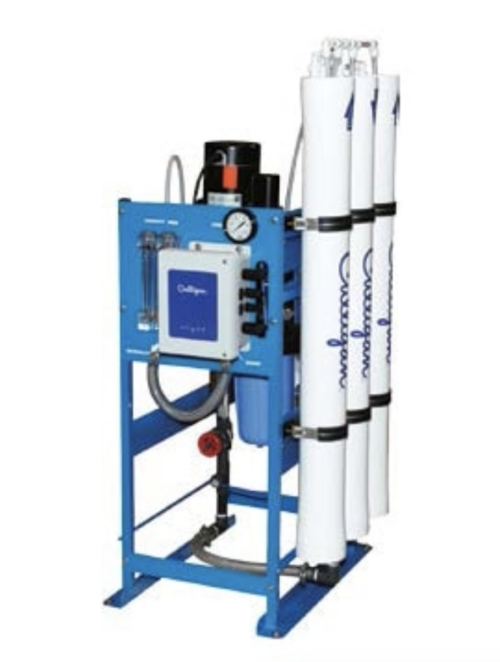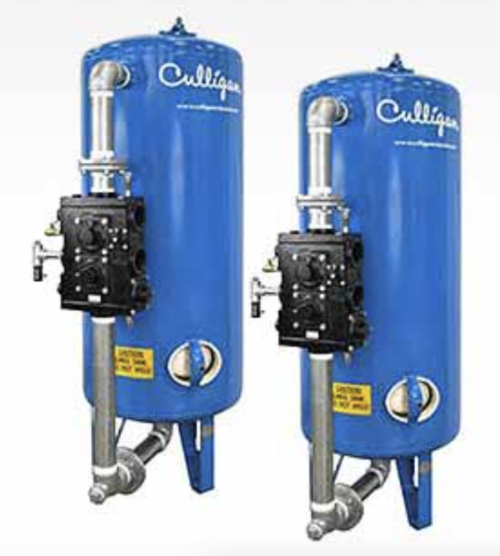Reverse Osmosis Systems vs. Water Softeners
Leave a CommentReverse Osmosis vs. Water Softeners: What’s The Difference?
Reverse osmosis (RO) systems are advanced filtration systems used to purify water. Conversely, water softeners are designed to remove minerals and other impurities that can lead to scale buildup. Both of these systems can help businesses meet critical quality standards and improve operational efficiency. In this article, we will compare reverse osmosis and water softener systems, their benefits, and their uses in different industries.
How Does Reverse Osmosis Work?

Benefits of Reverse Osmosis Systems
Reverse osmosis can be used to treat water for small or large flow applications, offering the following benefits:
- Reduced costs. Reverse osmosis systems are a cost-effective filtration method compared to other purification methods.
- Cleaner water. Reverse osmosis produces pure water that is free of salts, minerals, and contaminants, improving the cleanliness and efficiency of various industrial and commercial processes.
- Improved taste. Reverse osmosis systems remove a number of minerals and impurities, resulting in better-tasting water.
Thanks to advanced water filtration technology, there are an increasing number of reliable and efficient reverse osmosis systems available that can lower operating costs and improve post-treatment operations. These systems are generally easier to maintain and can be configured according to application-specific needs.
How Does Water Softening Work?

Benefits of Water Softening Systems
Water softening offers numerous benefits, including:
- Improved product quality. Water softeners provide a steady supply of high-quality water that doesn’t leave streaks or minerals on products.
- Increased efficiency. Water softening systems help prevent mineral buildup and clogged equipment, resulting in lower energy consumption and fewer repairs.
- Reduced operating costs. Using a water softener can help cut down on detergent and cleaning products, resulting in lower operating expenses.
Water softening systems are an ideal option for industrial environments involving hard water. They are available in a variety of configurations to meet unique installation and performance requirements.
Reverse Osmosis Systems and Water Softeners: Uses Across Major Industries
Industrial reverse osmosis systems and water softeners each have unique applications in high-performance sectors. Below are some examples of how these systems can be used to enhance water quality and improve operations.
Uses for Reverse Osmosis Systems
Reverse osmosis systems cater to industries that must meet specific safety and purity standards, such as:
- Food and beverage. Food and beverage facilities rely on reverse osmosis systems to make sure food is safe for consumption. The filtered water can be used to wash items like poultry and meat prior to distribution or as an ingredient in consumable products.
- Aerospace. High volumes of water are necessary to service spacecraft, commercial aircraft, and military/defense equipment of all kinds. Using highly precise reverse osmosis systems ensures compliance with safety requirements and prevents malfunctions caused by contamination.
- Pharmaceuticals. The pharmaceutical industry uses large amounts of water when producing medical products, cleaning agents, and other products. Implementing a reverse osmosis water treatment system helps reduce water use and the costs associated with production.
Uses for Water Softening Systems
Water softening systems are suitable for use in a range of industries, including:
- Hotel industry. Soft water is essential to create a comfortable environment for guests. Hotels must continually wash towels and linens, requiring water softeners to optimize washing machine lifespan and function. They must also provide a steady supply of high-quality water for guest use.
- Chemical manufacturing. Removing calcium/magnesium deposits is critical to achieving ideal chemical production conditions. This process also lowers the risk of damage caused by impurity deposition, resulting in greater energy savings and lower maintenance costs.
- Food and beverage. Food processing plants rely heavily on softened water to enhance product quality and reduce equipment wear from scale buildup, both of which are essential to maintaining efficient operations.
- Pharmaceuticals. The electrochemical process involved in water softening facilitates a wide range of pharmaceutical applications. Drug production and various medical procedures use water softeners to reduce scale and decrease the risk of contamination.
High-Quality Water Purification and Treatment Solutions from Reynolds Culligan
Understanding the differences between reverse osmosis systems and water softener equipment is key to selecting the right water filtration/treatment method for your industry. For three generations, Reynolds Culligan has provided advanced water treatment solutions for numerous industries. Our company is wholly dedicated to serving our customers throughout Pennsylvania, Maryland, Delaware, and New Jersey.
Our team can help you quickly determine which reverse osmosis and/or water softener system will fulfill your exact operating and regulatory requirements. Contact us to compare water treatment options or request a free estimate.